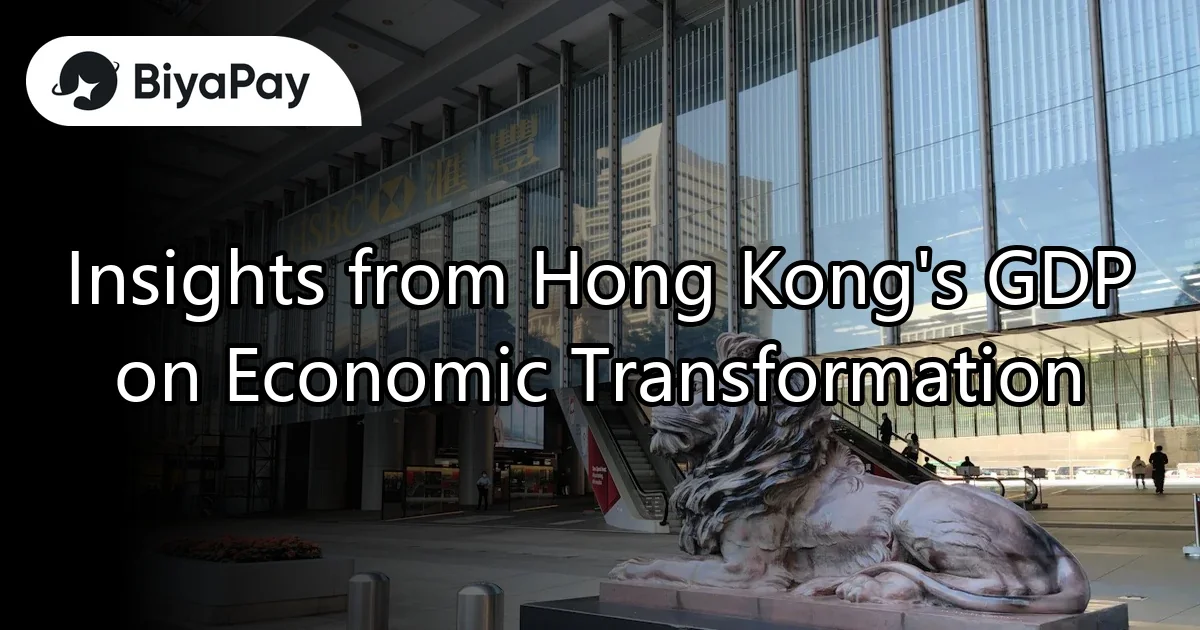- EasyCard
- Trade
- Help
- Announcement
- Academy
- SWIFT Code
- Iban Number
- Referral
- Customer Service
- Blog
- Creator
Insights from Hong Kong's GDP on Economic Transformation

Image Source: pexels
Did you know? Hong Kong’s GDP is not just a number; it is also an important indicator influencing economic policy. According to the latest data, Hong Kong’s GDP growth forecast for the first half of 2024 reaches 2.5% to 3.5%, with a year-on-year growth rate of 3.3% in the second quarter. This demonstrates the supportive role of trade and financial sectors in economic growth. The increase in local investment and goods exports further proves the effectiveness of Hong Kong’s economic policies. Meanwhile, the growth of the service sector and the contraction of manufacturing also reveal changes in the economic structure. These trends remind you that Hong Kong’s GDP is a key reference for the direction of economic transformation.
Key Points
- Hong Kong’s GDP is an important indicator of economic policy, and understanding its changes can help you grasp economic trends.
- The service sector is the core of Hong Kong’s economy, and improving the quality of services can promote GDP growth.
- The singular economic structure poses risks for Hong Kong, and promoting industrial diversification is key to the future.
- Educational reform can cultivate skills needed for the future, and supporting vocational skills training programs is crucial.
- Strengthening regional cooperation can enhance Hong Kong’s economic resilience, promoting resource sharing and stable growth.
Current State and Challenges of Hong Kong’s GDP

Image Source: pexels
Main Components of Hong Kong’s GDP
Did you know? Hong Kong’s economic model is dominated by the service sector, which is the core component of Hong Kong’s GDP. According to World Bank data, the manufacturing sector accounts for less than 7%, and manufacturing itself constitutes only 1%. This means that Hong Kong’s economic structure heavily relies on the service sector, such as finance, tourism, retail, and transportation industries. The performance of these industries directly impacts Hong Kong’s GDP growth.
Moreover, Hong Kong’s economic development is closely tied to the economy of mainland China. The growth of tourism and retail often depends on the spending power of mainland tourists. While this reliance brings stable income sources, it also makes Hong Kong vulnerable to external economic fluctuations.
Internal and External Challenges to Hong Kong’s GDP Growth
Hong Kong’s GDP growth faces multiple challenges, including internal structural issues and the impact of the external economic environment. Below is some specific data to help you better understand these challenges:
| Indicator | Data | Change |
|---|---|---|
| Private Consumption Expenditure | Year-on-year decrease of 1.2% | Contracted for the 4th consecutive quarter |
| Government Consumption Expenditure | Year-on-year increase of 1.2% | Rising |
| Gross Domestic Fixed Capital Formation | Year-on-year increase of 2.8% | Rising |
| First Quarter GDP Growth | Year-on-year increase of 3.1% | Higher than expected |
| Last Year’s Fourth Quarter GDP Growth | Year-on-year increase of 2.5% |
From the data, it can be seen that the continuous contraction of private consumption expenditure reflects a lack of confidence among local residents, while the rise in government consumption expenditure highlights the importance of public investment in supporting the economy. Additionally, the value added by Hong Kong’s import-export trade and wholesale-retail sectors only increased by 1.1%, indicating weak external demand.
On the external front, global economic uncertainty and geopolitical risks exert pressure on Hong Kong’s trade and financial sectors. Hong Kong’s service-dominated economic model, while performing well in stable periods, appears fragile without manufacturing support in the face of global economic fluctuations.
Impact of Hong Kong’s GDP on Policy Formulation
Hong Kong’s GDP data not only reflects the economic status but also directly influences policy formulation. For example, Hong Kong’s economic development has gone through three stages: industrialization, industrial relocation, and service sector dominance. During the industrialization stage, the demographic dividend brought by mainland immigrants promoted high GDP growth. Subsequently, industrial relocation after the 1980s led to the hollowing out of manufacturing, with the service sector gradually becoming the dominant force in the economy.
Currently, the Hong Kong government has proposed the slogan of “re-industrialization,” attempting to address the risks of a singular economic structure by developing high-tech manufacturing. This policy direction is formulated based on a deep analysis of Hong Kong’s GDP data. You can see that policy adjustments are closely tied to changes in economic data.
Tip: Hong Kong’s GDP data is not only a barometer of the economy but also an important basis for policy formulation. Understanding this data can help you better grasp the future direction of Hong Kong’s economy.
The Necessity of Economic Transformation

Image Source: pexels
Impact of Globalization on Hong Kong’s Economy
Globalization is reshaping the global economic landscape, and you may have noticed that Hong Kong’s competitiveness is facing challenges. Singapore’s “RIE2020” plan has attracted world-class talent and R&D headquarters, demonstrating its efforts in technological innovation. Mainland China’s “Mass Entrepreneurship and Innovation” policy has boosted the innovation capabilities of cities like Shenzhen and Hangzhou, whose competitiveness has surpassed Hong Kong’s. Shenzhen’s successful transformation and upgrading, achieving technology-driven development, has become a significant competitor for Hong Kong.
Hong Kong’s economic model is overly reliant on the service sector and lacks an industrial base driven by technological innovation. You may ask, how does globalization affect Hong Kong? The answer is simple: globalization accelerates the flow of technology and talent, allowing other cities to rapidly rise in innovation and technology fields. If Hong Kong does not undergo economic transformation, it will struggle to maintain its competitiveness.
Technological Progress and Digitalization Challenges
Technological progress and digitalization are reshaping the global economy. Are you aware of Singapore’s achievements in this area? The number of foreign scientists and engineers in Singapore has increased sixfold in 25 years, solidifying its position as Asia’s digital R&D hub. Companies like Accenture, Google, and IBM have established R&D bases in Singapore, with plans to create a “Global Innovation Alliance” in the future.
In contrast, Hong Kong’s progress in digital transformation is relatively slow. You may find that Hong Kong’s tech industry is limited in scale, and the development of digital infrastructure lags behind other competitive cities. This situation poses challenges for Hong Kong in attracting tech talent and companies. If Hong Kong does not accelerate its digital transformation, it will struggle to secure a place in global technological competition.
Risks of a Singular Economic Structure
Hong Kong’s economic structure is highly dependent on the service sector, and you may have noticed that the manufacturing sector’s share has fallen to less than 7%. This singular economic structure makes Hong Kong vulnerable to external economic fluctuations. When the global economy is unstable, Hong Kong’s service-dominated model cannot provide sufficient support.
You may ask, what are the risks of a singular economic structure? The answer is that a lack of a diversified industrial base will limit Hong Kong’s long-term development potential. Other cities, such as Shenzhen, have successfully reduced the risks of a singular economic structure through technology-driven industrial upgrading. Hong Kong needs to learn from these successful cases and promote economic diversification to remain stable and competitive in the future.
Insights from Hong Kong’s GDP on Economic Transformation
Talent Development and Skill Upgrading
You may have noticed that Hong Kong’s economic transformation relies on high-quality talent and continuously upgraded vocational skills. However, according to competitiveness rankings by IMD and the World Economic Forum, Hong Kong’s vocational skills education is relatively lagging. This situation may limit Hong Kong’s competitiveness in the waves of globalization and digitalization.
Chief Executive Carrie Lam announced an investment of USD 5 billion in basic education for primary and secondary students, which is an important starting point. However, educational investment should focus more on skills required for future workplaces. With the widespread adoption of factory automation, many traditional jobs have disappeared. You may ask, what does the future workplace need? The answer is digital skills, innovative thinking, and interdisciplinary capabilities. These skills will help Hong Kong’s younger generation stand out in the global market.
Tip: You can support vocational skills training programs to help Hong Kong’s workforce adapt to the needs of economic transformation.
Development Opportunities for Industrial Clusters
Hong Kong’s economic structure is highly dependent on the service sector, but the development of industrial clusters can inject new vitality into the economy. According to the Future Economy Committee Report, Singapore’s economic growth relies on the stable development of manufacturing and industry. This indicates that industrial clusters play a crucial role in stabilizing the economy.
You may ask, how can Hong Kong capitalize on the opportunities of industrial clusters? The answer lies in developing high-tech manufacturing and innovation industries. For example, Hong Kong can learn from Singapore’s experience, attracting international companies to establish R&D centers and promoting connections between local businesses and international markets. This can not only boost Hong Kong’s GDP growth but also reduce the risks of a singular economic structure.
Data Shows:
- Hong Kong’s manufacturing sector accounts for less than 7% of GDP, only 1%.
- The proposal of re-industrialization policies demonstrates the government’s emphasis on industrial diversification.
Building an Innovation Ecosystem
Innovation is the core driver of economic transformation. You may have heard of Shenzhen’s success story. Shenzhen has enhanced its economic competitiveness through technology-driven innovation. This provides valuable insights for Hong Kong.
Singapore’s “RIE2020” plan is also worth referencing. The plan has attracted world-class talent and R&D headquarters, promoting innovation capabilities. Hong Kong can learn from these successful experiences to build its own innovation ecosystem. For example, the government can provide more funding to support startups and strengthen cooperation with international innovation institutions.
You may ask, how does an innovation ecosystem affect Hong Kong’s GDP? The answer is that innovation can drive the development of emerging industries, thereby improving the quality and speed of economic growth. When Hong Kong becomes an innovation hub, it will attract more international investment, further consolidating its global economic position.
Action Suggestion: Supporting innovation and entrepreneurship programs and strengthening technological infrastructure will help Hong Kong maintain competitiveness in the global economy.
Action Suggestions
Supporting Innovation and Technological Development
You may have noticed that technological innovation is the core driver of Hong Kong’s economic transformation. Hong Kong needs to strengthen support for the tech industry to attract more international companies and talent. Below are some successful cases that can provide insights for Hong Kong:
- Singapore’s digital ecosystem has attracted a sixfold increase in foreign scientists and engineers engaged in research work over 25 years.
- Companies like Accenture, Google, IBM, LinkedIn, and GrabTaxi have established R&D bases in Singapore, consolidating its position as Asia’s digital R&D hub.
- Hong Kong’s 2030 plan underwent three public consultations, collecting 9,000 public opinions, demonstrating the transparency and participation in the planning process.
Hong Kong can learn from these successful experiences to promote the establishment of an innovation ecosystem. You can support the government in increasing funding for startups and promoting the construction of technological infrastructure. These measures will help Hong Kong attract more international investment and enhance global competitiveness.
Tip: Supporting technological innovation can not only boost Hong Kong’s GDP but also promote economic diversification and reduce structural risks.
Promoting Educational Reform to Meet Future Needs
Educational reform is the cornerstone of Hong Kong’s economic transformation. You may ask, how does education affect the economy? The answer is that education can cultivate the skills needed for the future, helping the younger generation adapt to the challenges of globalization and digitalization. Below is the potential of educational reform:
- The application of big data can fundamentally transform the nature and system of education, demonstrating the immense possibilities of educational reform.
Hong Kong can leverage big data technology to enhance the personalization and efficiency of education. You can support the government in promoting vocational skills training programs to help students master digital skills and innovative thinking. These skills will help Hong Kong’s younger generation stand out in the global market.
Action Suggestion: Supporting educational reform can help Hong Kong maintain a leading position in future technological competition.
Strengthening Regional Cooperation and Economic Linkages
Regional cooperation is an important strategy for Hong Kong to maintain competitiveness. You may have noticed that Hong Kong’s economic development is closely tied to mainland China and other Asian cities. Strengthening regional cooperation can promote resource sharing and enhance the stability of economic growth.
Hong Kong can collaborate with cities like Shenzhen to promote technological innovation and industrial upgrading. You can support the government in strengthening ties with international markets to attract more foreign investment to Hong Kong. These measures will help Hong Kong maintain its significant position in the global economy.
Tip: Regional cooperation can not only enhance Hong Kong’s economic resilience but also promote industrial diversification and reduce external risks.
Hong Kong’s GDP is an important indicator of economic policy and transformation direction. According to the IMF report, Hong Kong’s GDP growth rebounded to 0.2% in 2020, with the financial services sector still maintaining a competitive edge. You can see that, despite structural challenges, Hong Kong still has transformation potential. Facing the challenges of globalization and technological progress, Hong Kong needs to promote innovation, reform education, and strengthen regional cooperation. These actions will help Hong Kong maintain competitiveness and consolidate its position in the global economy.
Tip: Economic transformation can not only boost Hong Kong’s GDP but also promote long-term stable development.
FAQ
1. Can Hong Kong’s GDP fully reflect the economic health?
Hong Kong’s GDP provides important economic indicators, but it may not fully reflect economic health. For example, GDP growth may mask issues like income inequality or environmental problems. You need to combine other data, such as unemployment rates and living costs, to fully understand the economic situation.
Tip: When analyzing GDP, remember to consider social and environmental factors.
2. Why does Hong Kong need to promote economic transformation?
Hong Kong’s economic structure is overly reliant on the service sector, and its competitiveness is gradually declining in the face of globalization and technological progress. You need to understand that economic transformation can promote diversification, reduce external risks, and enhance long-term stability.
3. How can Hong Kong attract tech talent?
Hong Kong can attract tech talent by providing innovation funding, improving digital infrastructure, and promoting educational reform. You can support the government in strengthening ties with international markets and creating a more attractive work environment.
Action Suggestion: Supporting startups and tech R&D can help Hong Kong attract more talent.
4. Why is re-industrialization important for Hong Kong?
Re-industrialization can help Hong Kong reduce the risks of a singular economic structure. You can see that high-tech manufacturing can boost GDP growth and promote industrial diversification, enabling Hong Kong to remain competitive in the global market.
5. How can Hong Kong address the challenges brought by globalization?
Hong Kong needs to strengthen regional cooperation, promote the establishment of an innovation ecosystem, and enhance education levels. You can support the government in formulating policies to promote resource sharing and technological development, which will help Hong Kong maintain competitiveness.
Tip: Globalization is both a challenge and an opportunity. Seizing opportunities will enable Hong Kong to move forward steadily.
Hong Kong’s GDP is projected to grow 2%-3% in 2025, with services dominating over 90%, yet a 1.2% decline in private consumption and manufacturing’s mere 1% share highlight risks of economic over-reliance, making diversification and digital transformation critical—how can you seize these opportunities? BiyaPay offers a digital financial platform, enabling seamless trading in Hong Kong and global markets without offshore accounts, helping you navigate economic fluctuations and cross-border capital needs.
Supporting USD, HKD, and 30+ currencies with real-time exchange rate tracking for transparency, plus global remittances to 190+ countries with remittance fees as low as 0.5%, it outperforms traditional banks’ costly and complex processes. A 5.48% annualized yield savings product with no lock-in period ensures balanced returns and liquidity. Sign up for BiyaPay now to leverage Hong Kong’s GDP transformation insights with BiyaPay’s global financial solutions for efficient, low-cost wealth growth!
*This article is provided for general information purposes and does not constitute legal, tax or other professional advice from BiyaPay or its subsidiaries and its affiliates, and it is not intended as a substitute for obtaining advice from a financial advisor or any other professional.
We make no representations, warranties or warranties, express or implied, as to the accuracy, completeness or timeliness of the contents of this publication.




Contact Us
Company and Team
BiyaPay Products
Customer Services
is a broker-dealer registered with the U.S. Securities and Exchange Commission (SEC) (No.: 802-127417), member of the Financial Industry Regulatory Authority (FINRA) (CRD: 325027), member of the Securities Investor Protection Corporation (SIPC), and regulated by FINRA and SEC.
registered with the US Financial Crimes Enforcement Network (FinCEN), as a Money Services Business (MSB), registration number: 31000218637349, and regulated by FinCEN.
registered as Financial Service Provider (FSP number: FSP1007221) in New Zealand, and is a member of the Financial Dispute Resolution Scheme, a New Zealand independent dispute resolution service provider.




















